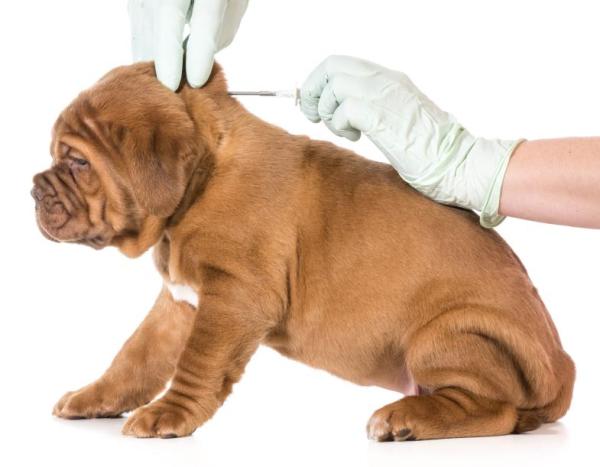My Puppy Is Throwing Up and Not Eating



See files for Dogs
Part of the reasons why a puppy is so adorable is their vulnerability. An instinct in us makes us want to take care of them and for good reason. When dogs are young, they are still developing. This doesn't simply mean they are getting bigger, but important aspects of their physiology, such as their immune system, is also not yet developed. When we see my puppy is throwing up and not eating, it particularly concerning. These are symptoms of various diseases and health problems which can harm puppies more than adult dogs. AnimalWised explains why a puppy is vomiting and what treatment options may be available.
Preventing health problems in puppies
Since puppies have an underdeveloped immune system, it is important we do what we can to protect them from health problems. For this reason, once we adopted a puppy into our home, we should follow these guidelines:
- Deworming: for both internal and external parasites. Follow the recommendations of our trusted veterinarian as different parasites affect different regions of the world. We need to prevent the puppy being in contact with other dogs as puppies which are asymptomatic in adult dogs can be very harmful to puppies.
- Vaccination: always respecting the vaccination schedule set by our veterinarian so they are effective. Vaccines protect dogs from life-threatening infectious diseases.
- Diet: preferably feed specific for puppies, since it is the one that is going to adapt to their growth needs.
- Safe environment: puppies are naturally curious, making it easy for them to access dangerous substances or objects.
- Weaning: do not interrupt the weaning process or prematurely remove them from their mother. This can have very serious effects on both their physical and mental well-being.
If observing these guidelines we see our puppy is throwing up and not eating, we need to seek veterinary assistance. Since prompt treatment is especially important for puppies, they will be able to make a diagnosis and begin said treatment as necessary.
Although it is important for puppies to be vaccinated and dewormed, there are very rare occasions when a puppy can throw up after being vaccinated. In these cases, it may be an adverse reaction to the vaccination. A serious reaction is even less likely, but it is important to take the puppy to the veterinarian if symptoms do not abate after 24 hours.

Reasons a puppy throws up and doesn't eat
There are some reasons why puppies throw up which don't have serious consequences. For example, if they get overexcited or exercise a lot after eating, they may throw up, but will be find soon after. There is still concern as vomiting can make puppies dehydrated. However, it will not be as serious other medical reasons why a puppy is throwing up and stops eating.
We should look at the condition of the vomit to help the veterinarian carry out their diagnosis. For this reason, we should look out for the following:
- Parasites: we may observe worms in the vomit or in the stool, which generally resemble white spaghetti. They indicate a heavy parasitic infestation. Larvae which look like grains of white rice also suggest parasites.
- Food: the amount of food in the vomit can help indicate the problem.
- Blood: can be fresh, digested (dark brown in color), clots, etc.
- Foreign bodies: pieces of or even a whole swallowed object, such as a stone, toy or a ball.
In addition to vomiting and anorexia (lack of appetite), we can observe other symptoms in our puppy such as diarrhea, fever, lethargy, apathy, etc. The symptoms will depend on the underlying cause responsible for the symptoms. In the following sections we will look at these possible causes in more detail.
Puppy throwing up due to parasites
Anorexia as a symptom can accompany various health problems. When accompanied by vomiting, it is possible the issue is due to intestinal parasites. We need to take the puppy to a veterinarian and not try to deworm them ourselves. The reason for this is that the parasite needs to be identified after a sample is taken and observed in a laboratory.
Treatment will be parasite specific and there are different deworming agents which may be effective. Although it is rare for infestations to cause serious health repercussions in adult dogs, puppies are much more vulnerable, especially if they have to deal with secondary issues. This is why we again emphasize the importance of deworming, following the guidelines recommended by the veterinarian.
Puppy vomite and stops eating due to infectious disease
Some very serious ailments can lead to a puppy vomiting and not eating, especially if accompanied by other symptoms such as diarrhea and lethargy. Parvovirus is a common virus among puppies which is potentially life-threatening. Tests for parvovirus can be bought at pet stores, but it is best to go to a veterinarian to be safe.
There is no cure for parvovirus in dogs (also known as canine distemper), so treatment is supportive and involves management of the symptoms. The puppy may need fluid therapy initially to restore their strength and counteract dehydration. Antibiotics may need to be administered if there are any secondary infections and the vet may prescribe antiemetics (to stop vomiting), gastric protection drugs, vitamin B12 and/or analgesics for pain.
Other diseases as serious as distemper can also cause vomiting and anorexia. Since there is no treatment, the best measure is prevention. A properly vaccinated animal can become infected, but it is rarer. If they are infected, the clinical picture and threat to their lives will be much lower. Therefore, if our unvaccinated puppy does not eat and vomits, they will be more at risk.

Gastroenteritis causing vomiting in puppies
Like humans, dogs can also suffer from inflammation of the gastrointestinal tract. In these cases we will see that our puppy does not eat and vomits. They may also have diarrhea and even fever. These processes usually resolve on their own in 24-48 hours, although anti-vomiting or gastric protectors may be prescribed. Only in the most severe cases, when fluid loss is profuse, will it be necessary to administer intravenous, subcutaneous or oral serum.
The causes of gastrointestinal inflammations can be varied, but it can be due to the ingestion of something toxic. This may be something as mild as spoiled food, but the weaker puppy will be more susceptible to its negative effects. Ingesting hygiene products or other toxic substances can also be the cause. Symptoms may pass on their own, but speaking to a veterinarian is recommended in case the problem is more serious.
Vomiting, diarrhea and anorexia can also be caused by a food allergy to some component of their diet. If the condition lasts over time, it can lead to a considerable weight loss, which will be an alarm signal for us to go to the vet. They will rule out the possible causes to find the diagnosis. The treatment will involve changing the feed to a hypoallergenic one specific to dogs with allergies. Generally, they are based on a composition without the usual proteins (such as chicken), replaced by salmon or deer, for example. These allergies can also manifest as skin problems in dogs.

Puppy vomits due to foreign body
Finally, puppies are curious animals still learning about their environment. This can lead not only to ingestion of toxic products, but also foreign objects which can become stuck in their throat or another part of their GI tract. Since the object is stuck, puppy might vomit food after they eat since it cannot pass.
It is important we do not try to remove the object ourselves unless it is clearly visible. The reason for this is because we might cause more damage pulling it out than it is causing by staying in. If the object has sharp edges, we can cut their mucus membranes and the puppy could have internal bleeding. It is best to take them to a veterinarian as they will be able to examine them and x-ray if necessary. In some cases, surgical intervention may be required to remove the object without causing damage.

This article is purely informative. AnimalWised does not have the authority to prescribe any veterinary treatment or create a diagnosis. We invite you to take your pet to the veterinarian if they are suffering from any condition or pain.
If you want to read similar articles to My Puppy Is Throwing Up and Not Eating, we recommend you visit our Other health problems category.








